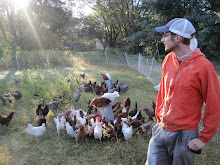It has been nearly six months since I left school in Iowa. Soon I will begin to resolve my college debts, and I know am not alone. Hundreds of thousands of college graduates will soon become obedient workers in an economy built to ensure that money, at all costs, never stops flowing. Yet still, many of them, myself included, had transformative social, political and spiritual experiences during their studies.
College, if nothing else, was an environment of ample free-time. And I give thanks that a handful of strong people helped me to radical shifts in consciousness through study and dialogue. But for the vast majority, college functions as a factory for the next generation of consumers who will live under the rule of ciphers, debts and bosses.
Most of you reading this know a young person who, by choice or necessity, is desperate for a safe, comfortable and lucrative career. As well they should be; no one needs the social and economic stigma attached to outstanding debt. Yet through this very process our youth, our education and our dreams are treated as the property of an economy that profits through co-opting our values and selling them back to us. Many young people are waking up to the truth that such a design has been based all along on an illusory and hopeless relationship with the world.
The degree of radical change needed in our economy and culture can, and should be, argued. But any sensitive person knows that we long ago lost the wise balance which has traditionally kept humanity healthy, happy and humble. Nowhere is this reflected as clearly as in our work; how we make wages in order to eat, live and survive. Most work today is organized by one ruling principle; the endless exchange of the dollar. But if our communities are to achieve any sustainable harmony, we must have work that seeks much more than a Capitalist economy can offer us.
What that looks like should be determined on a decentralized and creative basis. But good work always responds to a real, material need of humans attempting to live healthy and connected lives. My experience farming has taught me that the most vital piece of this multi-faceted solution is the production of healthful food on bio-diverse and modestly scaled farms. When what and how we create can be nourishing for our bodies and our soil, we can also meet peoples fundamental need for a socially purposeful freedom. Instead of mass-production, we can have production by the masses; thus allowing us to eliminate or minimize environmentally and socially destructive agricultural inputs.
With this in mind, food is much more than nutrition. It is a means by which we secure health, sustainability and the strength to face hardship. As long as our food system is dominated by a cash economy, I believe we will remain an endangered and undernourished people.
-Mark B.
Reid Riding
9 years ago






